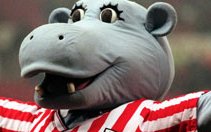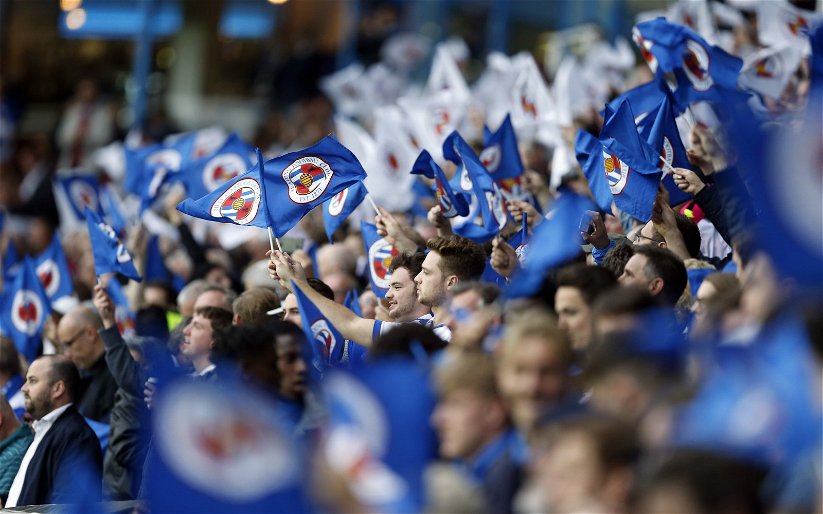Our star striker Kevin Doyle is driven not by his ambition but by his fear. His fear of being just one bad injury away from a ruined career. His fear of waking up to one day discover that he`s “crap”. The fear of his name vanishing from the impressive list of the Premiership leading marksmen, never to be seen again.
‘I am constantly terrified that something will be taken away,’ he explained. ‘That all these good things will end. I am afraid this could just stop. In some ways I think it`s a good attitude to have but I always think the worst.
‘I know how quickly things can change for the good, but I also know how quickly things can change for the bad.’
His eight Premiership goals for the Royals would suggest he is not about to lose his touch, but the 23-year-old forward`s pessimism is perhaps understandable when you consider the tragedy that struck his family thirteen years ago.
He is the youngest of five children and Bernard, the oldest, was his hero. That August, Bernard was diagnosed with testicular cancer, and by October, he was dead.
‘Just six weeks,’ said Doyle, ‘it was a massive shock. He was only 21. I was 11, so it was all a bit strange for me. But I looked up to him massively.
‘It hit the family really hard. It brought us all together. My sisters are both married but they live within a mile of our home. My other brother works in the pub that is now owned by my parents.
‘But when Bernard died we just had to get away from all of it. We moved houses and my dad sold the family business because he had planned to hand it over to my brother.’
The Doyle family were from Wexford in the south-east corner of Ireland and his father ran an international haulage company.
‘My dad was lining him up to take charge,’ said Doyle. ‘I remember Bernard driving trucks to Italy and Spain. I`m not sure how he managed it but I seem to recall him doing stuff like that when he was only 17. It must have been when my dad was stuck for a driver.
‘But dad got sick of it, folded the business, bought a farm with some horses and also bought a pub. My other brother, Padraig, now runs that and I worked there when I was younger.’
He admits that coming from such an affluent background probably delayed his arrival in English football. Only 18 months ago Doyle was playing for Cork City in the League of Ireland with a take-home salary of £450 a week. Just eighteen months ago Reading manager Steve Coppell watched him against Waterford and then Bohemians before agreeing to pay Cork £78,000 for his services.
‘I was not playing barefoot in the street,’ he said, which is his way of admitting he is slightly unusual in that the majority of professional footballers come from rather less privileged backgrounds.
‘I obviously had some talent but I was well looked after when I was young. Maybe, because of that, I didn`t push myself. I played Gaelic football to a high standard as well and I had other options. I worked hard at school and I thought about going to college to do a business studies degree.
‘I was an ignorant barman when I worked at the pub ? I wasn`t up for much chit-chat and when it was last orders it really was last orders ? but at the same time I was enjoying myself, going out.
‘It was only when I was 19 or 20 that I decided to knuckle down, take things a bit more seriously and get fitter and sharper. I decided I wanted to do better.’
By then he had already escaped the attention of the English scouts who have scoured the Irish clubs for years in search of bright young talent.
‘I never had trials here or anything like that,’ he said. ‘I was offered trials at Sunderland and Swindon, but I injured my ankle a few weeks before I was supposed to go over and that was that. It comes to a stage when they stop scouting you and you have to make your name in Ireland. But I was happy playing in Ireland. I wasn`t desperate to get away.’
Aided by Cork`s decision to move him from the right wing to up front, it was his performances for the Republic of Ireland`s Under 21 side that started to attract attention.
‘Nobody had shown a massive interest in me but I started scoring a lot for the Under 21s and maybe that helped,` he said.
‘Reading started sending their scouts over and then Steve Coppell came to see me. I knew he was there watching and although I didn`t play particularly well, I scored in both games.
‘I think they decided to take a gamble on the back of that, because it was only two or three years ago that people had no confidence in me playing in England`s Conference, let alone the Premiership.
‘By the time I arrived in England I was 22 and it wasn`t like I was instantly brilliant. It has been a hard slog.
‘I`ve had to work to get to this point and even now I can`t believe it when I see my name among the Premiership`s top scorers. It`s a weird one ? for me and my family. I have ghosted in at the top without even me noticing. Mad.’
Doyle likes to think his older brother has had a part to play in the successful transition he has made from Cork to the English Championship and then to the Premiership ? and in the success he has enjoyed as a senior international.
In September he made his full competitive debut against Germany and members of his family collected on a bet.
Players, explains Doyle, never get selected to play for their country from the League of Ireland, so four years ago his family put down £100 at odds of 150-1.
‘My mum is always saying that my brother is looking out for us,’ he said. ‘When you are under pressure, it`s nice to be able to say: ‘Someone give me a hand here’. It`s nice to think that someone is looking out for you.
‘There are times when I score a goal, in certain situations, and I look up and think: ‘Thanks for that’. Like against Manchester United when I scored from the penalty spot. Edwin van der Sar got a hand to it but it still went in. After that I thought: ‘Thanks for that’.
‘My mum will come and say: ‘There you see, your brother is looking after you’. Over the last 18 months I think he`s been working overtime.’
Share this article
Related Articles
2 comments
Comments are closed.


Seems a genuine nice lad.
he does have to prove himself over more then one season, but i think he’s got it in him to excell at the highest level!